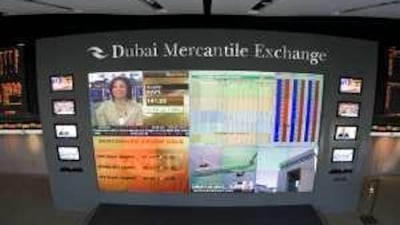The Dubai Government has revealed for the first time the price it charges for oil exports to try to bolster the stature of a crude oil futures contract traded on the Dubai Mercantile Exchange (DME). Dubai crude delivered in September will cost US$0.18 less than the price of Oman sour crude traded on the DME, the Department of Petroleum Affairs announced, two days after the DME saw trade volumes hit a record high as a result of Dubai's new pricing scheme.
Under the new system, Dubai will directly tie the price of its crude to the futures contract, minus the discount. The move was read as a strong endorsement of the DME's two-year-old futures contract, which aims to become a benchmark for Middle East oil prices. The DME recorded 8,076 trades on Tuesday. Volumes dropped to 5,621 Wednesday and data for yesterday was not available by the time of publication.
"The last two days should have happened two years ago," said John Samuels, the chairman of Translux, which regularly trades on the DME. "It is simply a reflection of the so-called market makers finally seeing that Dubai is serious and therefore a trading hub." Most of the big Gulf oil exporters set their official selling prices for crude on the basis of prices published by trade press, which survey both buyers and sellers. Those numbers are influenced by futures contracts traded in London and New York.
The DME argues that its Oman contract better reflects the quality of Middle East crude and would serve as a more accurate benchmark for pricing Middle East oil. But up until this week, trading volumes have stayed low, often falling under 1,000. The New York Mercantile Exchange sees several hundred thousand trades a day. Mr Samuels said volumes would have to exceed 10,000 trades a day for oil traders in New York and other major trading centres to take notice.
"The goal is 50,000 contracts a day, and it's do-able," he said. "Once it starts, then people get excited about the options, the gaps. There are endless opportunities. It feeds on itself." The interest would fuel the growth of Dubai's financial sector, Mr Samuels said, because bigger trading firms would open offices in the city. "Right now the Gulf region has an opportunity not only to be a production hub, but an actual trading hub," he said. "It requires the market makers; the independent traders as well as the Goldman Sachs of the world."
cstanton@thenational.ae

